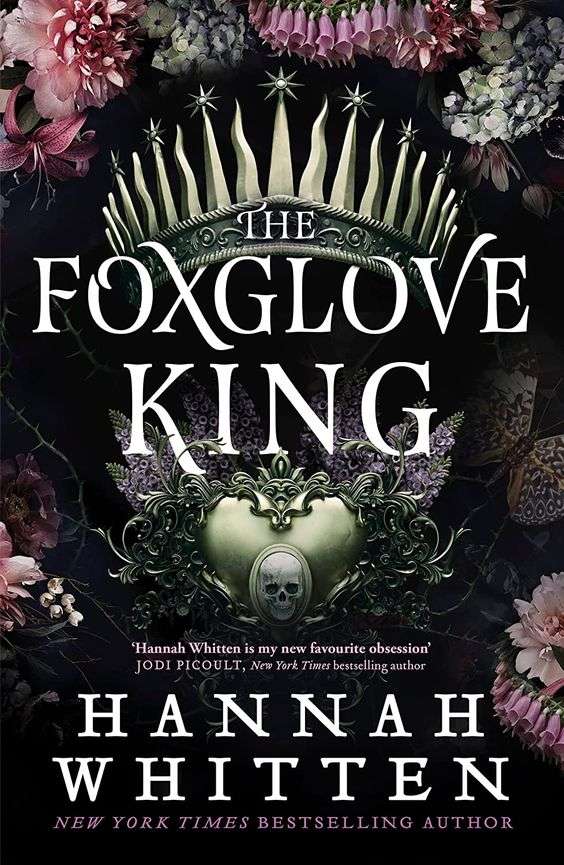We’ve implemented some new protocols around sending us messages via this website. Please email website “at” britishfantasysociety “dot” org for any issues.

For all things fantasy, horror, and speculative fiction
-
Announcement:

The Foxglove King by Hannah Whitten
The Foxglove King by Hannah Whitten
The Foxglove King by Hannah Whitten
Orbit Books, HB, £14.45
Reviewed by Sarah Deeming

Lore is a drug dealer’s runner. She spends her time avoiding the law both because of her dubious occupation and affinity with the outlawed death magic. When a job goes wrong and she is captured, Lore comes to the attention of the Sainted-King’s warrior-monks, who have similar power. They offer Lore an ultimatum; Lore can spy for the Sainted-King and discover who is the traitor in his court or be burned as a witch. With no real option, Lore is thrust into a decadent court of privilege and intrigue, unsure who to trust. With her power surging and her emotions torn between a warrior-monk, Gabriel, and the Sainted-King’s son, Prince Bastian, Lore must uncover the spy before she is killed.
The Foxglove King has a unique magic system based on the story’s mythology. The whole court follows the religion of the Wounded God, who killed a goddess after she tricked him. With her body under the ground, the goddess’s death magic seeps from her body, filling the streets with Mortem. Lore is one of the few people who can sense Mortem as well as use it. The warrior-monks can also feel Mortem and use it to a degree, but they don’t have Lore’s power. The Sainted-King is the Wounded God’s representative on earth, and Bastian will succeed him.
The Sainted-King’s court is very lavish and hypocritical. For example, the drugs Lore’s gang pushed would have seen her in jail, yet the drug is freely available in the court, and the King is dosed on it every day. Lore’s magic isn’t that different from the monks’, but because she hasn’t committed her life to the service of the Wounded God, she’s a criminal.
For me, the book missed the mark. While the court and magic system were well thought out, they didn’t stand out as unique from other stories of this genre. There was nothing new, and it was the same with the Sainted-King’s court. We have experienced other decadent courts where the beauty is barely skin deep, and the ugliness has strong roots that are more vivid and stand out from the crowd. In The Foxglove King, the court felt two-dimensional.
The romantic element in any story is an important feature for me, and it must feel authentic, built on shared experiences and conversation rather than initial impressions. The love triangle felt forced. As soon as Lore meets Gabriel, she feels as if she’s met him before, and then she has the same reaction when she meets Bastion. I found myself not caring which one she would end up with, partly because I didn’t get on with Lore as a main character. I found her too glib. And this was a real letdown after being completely enraptured with the romance in Whitten’s first novel For the Wolf.
Ultimately, I felt my enjoyment of The Foxglove King was affected by how much I enjoyed her first duology Wilderwood. I loved her first books because I bought into the characters and the subversion of traditional fairy tales. The Foxglove King felt a little too stale after that. Not that this will stop me from reading Whitten’s other works. I do believe she is a talent to watch.
Explore the blog:
Blog categories:
Latest Posts:
Tags:
#featured (56) #science fiction (25) Book Review (264) events (44) Fantasy (231) Graphic Novel (13) horror (136) Members (62) Orbit Books (48) profile (43) Romance (17) Science Fiction (50) short stories (28) Titan Books (52) TV Review (15)
All reviews
Latest Reviews:
- THE HOUSE ON THE BORDERLAND by William Hope Hodgson
- Monstrum by Lottie Mills
- Mood Swings by Dave Jeffery
- Yoke of Stars by R.B. Lemberg
- Hera by Jennifer Saint
- The Black Bird Oracle by Deborah Harkness
- RETURN OF THE DWARVES By Markus Heitz
- Delicious in Dungeon
- Toxxic by Jane Hennigan
- THIS ISLAND EARTH: 8 FEATURES FROM THE DRIVE-IN By Dale Bailey
Review tags:
#featured (2) Action (4) Adventure (4) Book Review (28) Fantasy (18) Featured (2) Feminist (2) Gothic Horror (3) Horror (14) Magic (3) Orbit Books (3) Romance (6) Science Fiction (5) Swords and Sorcery (2) Titan Books (7)